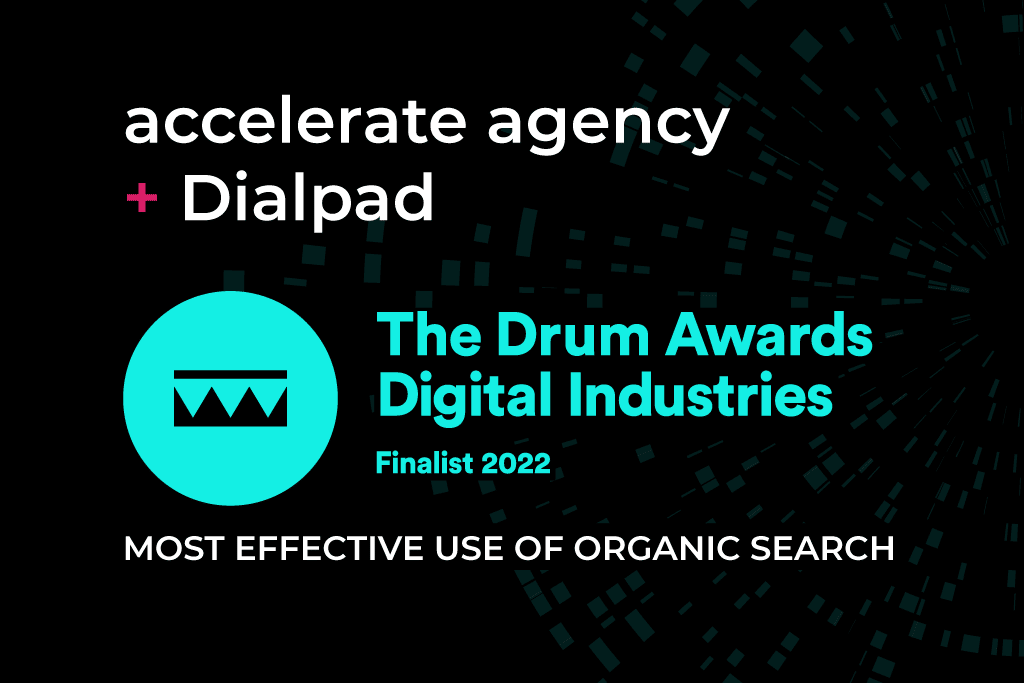Striving for excellence
Here at Accelerate Agency we pride ourselves on the service we provide our clients. Their needs are our passion, and when those needs include content creation, we shift into top gear. That’s because we understand that top-class content creation can make or break a business’s online presence.
To deliver the very best website content, blog posts, advertising copy, and more, we’ve assembled an elite team of content creators. Our writers and editors all love producing precisely what our clients need, when they need it.
Book a Consultation
But how do you go about building such a top-notch team? We’re glad you asked. We’ve developed a stringent recruitment process that ensures we scoop up only the top talent, and help them to excel when working with us.
Let’s take a look at the multi-step process we use to hire writers and editors.
The Pen is Mightier Than the Sword; Hiring Writers
We’re always looking to deliver more and more to our clients. That’s why we run ongoing recruitment for writers to make sure we never miss out on a wonderful wordsmith.
Our current writing team numbers a little over 40. Now that may sound a lot, but when you consider over 5,000 people applied to write for us between September 2020 and the beginning of February 2021, that puts it into some proper context.
So, how do we go from thousands of applicants to working with the creme-de-la-creme?
1. Screening stage one – language & grammar
Every single applicant to our writing roles must first take a spelling, grammar, and punctuation test. We require a score of 80% or more on this test for a writer to progress further through our process.
Of the 5,000 recent applications we’ve received, approximately 1,400 moved beyond stage one.
2. Screening stage two – unpaid writing test
Now, there’s more to creating top-class content than knowing where and when to use the Oxford comma. That’s why the second stage of our writing recruitment process drills a little deeper.
We ask all applicants who passed stage one to undergo an unpaid writing test. We give them a short content brief—like those our writers work with day-to-day—and ask them to write the first 600 words of a dummy article.
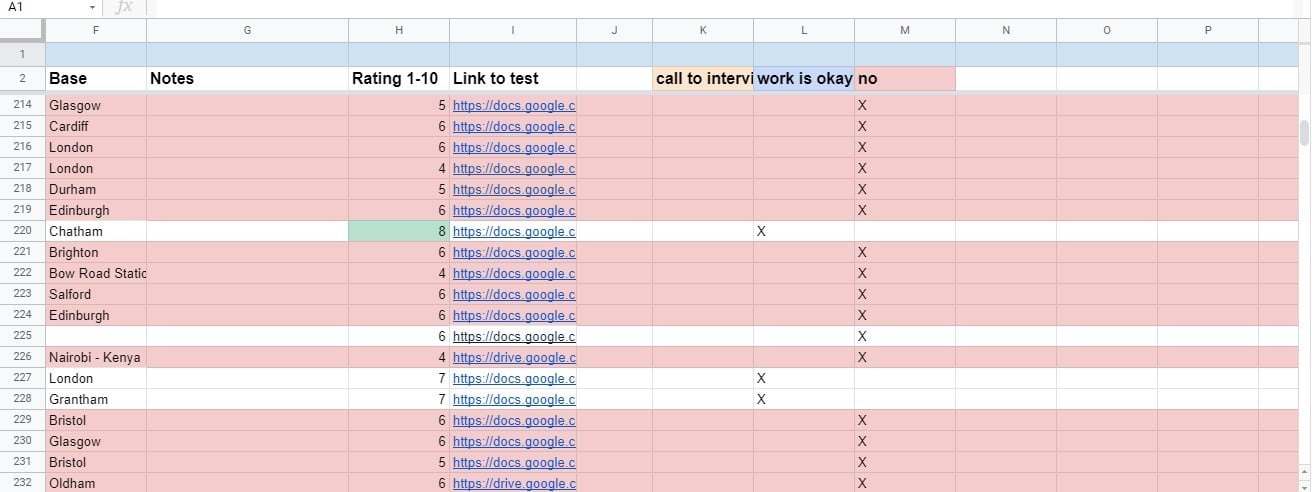
Each and every one of the c.1,400 applicants who reach stage two write the same test piece, with the title ‘5 Ways to Improve Omnichannel Customer Experience’. That makes it easier to assess the applicants against one another,(although it can get a little repetitive for those who do the checking – trust me!).
When examining test pieces, there are a number of factors taken into account:
- Ability to write to the brief – does the writer fulfill all the technical requirements?
- General quality of writing – are there spelling errors, grammatical problems, or troublesome formatting in evidence?
- Research & knowledge – has the writer grasped the ins and outs of the topic? Do they write as if they are an expert?
- Storytelling – does the writer excel in telling the story of the piece? Would you come away as a reader having been both informed and entertained?
- SEO & linking awareness – Has the writer used header tags and other elements to make their test piece more SEO-friendly? Do they know to link out to the sources of statistics and other information?
Based on all those factors and more, each test piece is given a score between zero and ten. A score of zero, for example, may come if someone delivers a 100-word piece when they’ve been asked for 600—it happens! A score of ten? Well, we’ve not seen one just yet, so tell us if you know anyone who could create such a piece (no, really – tell us!).
Anyone who scores eight or higher for their test piece moves on to stage three. How many applicants does that apply to out of the 1,400 tests? Around 45!
3. Screening stage three – video call
Applicants reaching stage three get rewarded with a short video call with one of our SEO team. Yes, we know that sounds more like a punishment.
This stage is important, though, as we like to know who we’re working with. Even just a short face-to-face, via the wonders of video calling technology, helps us ensure each prospective writer is the correct fit for our team. It also helps the applicants get to know us, and check that the role will work for them.
4. Paid trial period
After the video call, our initial screening process comes to an end. It’s at this stage that we start actually working with writers on a professional basis—everything has been unpaid assessment up to now. 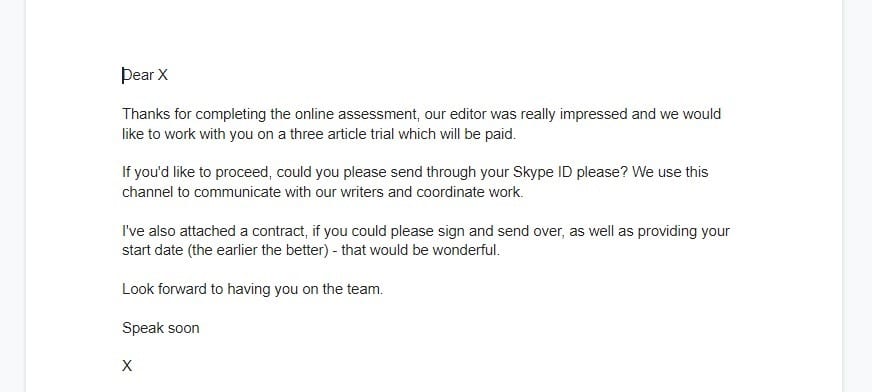
To begin, we invite writers to sign a freelance contract and take part in a paid three-piece trial. They receive real content briefs, with real requirements, and real deadlines. We’re not monsters though—our editors work closely with the writers throughout to help get them up to speed.
Once a writer has completed and submitted the three pieces of their trial, they’re paid for the work. If the posts and articles have impressed the editorial team, too, the writer will then be invited to join our team on an ongoing basis.
5. Further progression
The world of high-quality content never stands still, and we don’t want our writers to, either. Those who consistently impress with their work progress from writing our usual highly important content to writing any extra-special, even more important content our clients may require. Only a select band of wordsmiths make it this far.
To Err is Human, to Edit Divine; Hiring Editors
No content creation team is complete without its editors. If the best writers are like flamboyant racing drivers, editors are like the race engineers and pit crew that keep them on the road. In other words, they’re critical, too.
That’s why the small and select team of editors at Accelerate Agency have also gone through a rigorous recruitment process. You wouldn’t want just anyone changing your tyres if you’re going to be driving at 200mph, would you? Okay, okay, that’s it with the motor racing analogies now, we promise.
1. Screening stage one – tailored editor test
Every applicant to become an editor with Accelerate is sent an editor test which we’ve tailored to closely replicate the work our editors do day-to-day. It includes a content brief and a short amount of content produced by an imaginary writer (or rather, one of our editors) under the title ‘How to Keep Your Remote Sales Team Productive’. Spoiler alert; they made some mistakes. 16 of them to be precise.
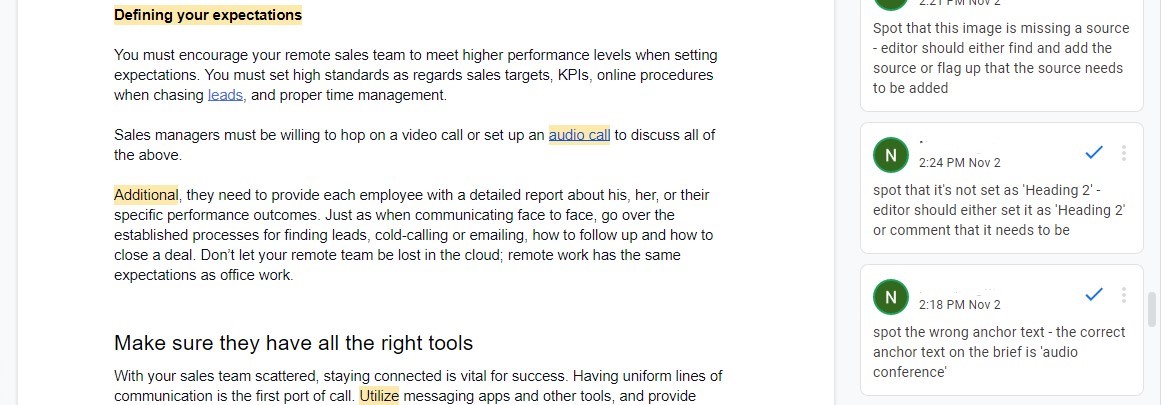
Could you spot the deliberate mistakes?
We ask our would-be editors to make a copy of their test document—which doesn’t have the useful pointers shown above, by the way—and add their own suggestions for corrections. Only those who spot at least 13 of the 16 then move on to stage two.
2. Screening stage two – CV examination
It’s at this point that we take a fine tooth comb to our applicants’ CV’s. We don’t do it first, as we like to judge people on what they can do, not what they’ve done before. That being said, we are still on the lookout for relevant experience, and plenty of it.
By looking over CVs at this stage, we can further refine our selection of editors for the subsequent stages of the process. We’re only looking to hire the people who can meet our own and—more importantly—our clients’ high expectations, after all.
3. Screening stage three – video call
Editors who get this far will have a video call with not one, but two of our SEO team—lucky them! This helps both parties get to know one another better, and to ask and have answered any remaining queries.
4. Paid trial period
If an applicant’s video call goes well, it’s paid trial time. For half a day, the new editor works closely with Accelerate’s Senior Editor, and not just to see how much hardship they can endure! They’ll get introduced to real content briefs and taken step-by-step through what they need to do.
During the half-day trial, the editor will work on real pieces of content, but all under a watchful eye. If the applicant excels under these real-world conditions, they’ve shown themselves as someone we want on our team.
Striving For Excellence Can Ruffle Feathers
You won’t have failed to notice that only a tiny percentage of those who enter our recruitment process make it to the end. That, inevitably, means that many are left disappointed at not getting to join us. We also simply can’t reply personally to many hundreds of applicants, which we understand can be frustrating.
Either due to a misunderstanding of the process or for reasons known only to themselves, though, one or two unsuccessful applicants make their disappointment (very) public.
Misleading reviews
A couple of unsuccessful applicants have taken to review platforms to vent their frustrations. These reviews are—either mistakenly or deliberately—misleading in a couple of principal ways.
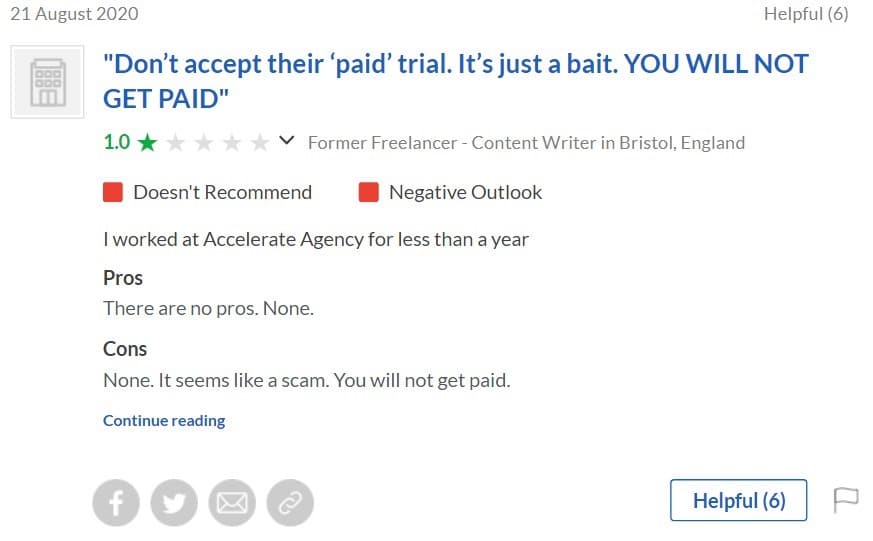
The above review is misrepresenting our unpaid writer test as a paid trial. It’s made clear to all applicants that the short test piece is an unpaid assessment. So, the writer here is right when they say ‘YOU WILL NOT GET PAID’, it’s just that 99.9% of applicants read instructions clearly enough to realise that from the get-go.
Malicious communications
One or two people have taken things further when they’ve not made it through our selection process. Recently, a pair of unsuccessful applicants—or, at least, two different online accounts—decided to send malicious and bad-tempered messages, having not been brought on board.
Their accusation? That we ask applicants to write different test pieces so that we can then publish their work. Their ‘evidence’, as one of the pair described it in a message? Well, it’s this:
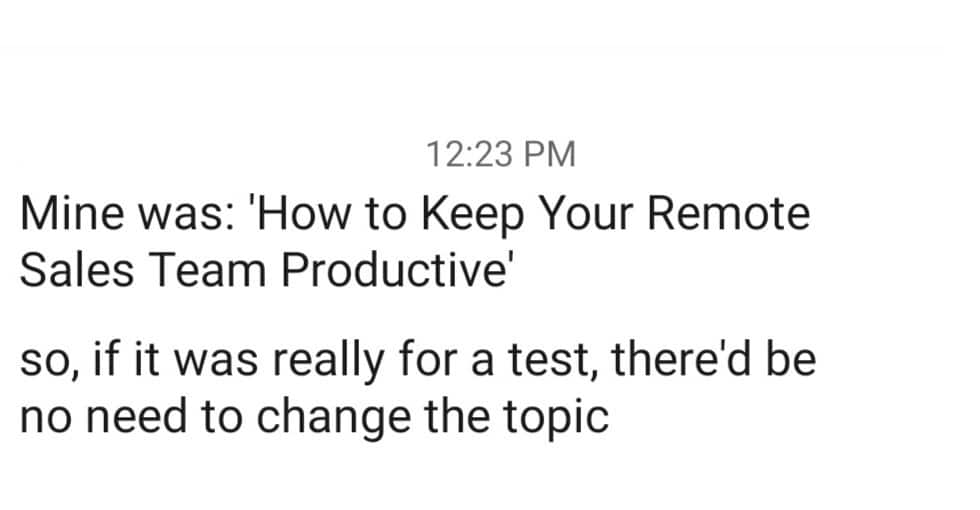
Wait, where do we recognise that title from?
That’s right, a message from unsuccessful applicant B—let’s call him A***** ******s—to unsuccessful applicant A (A****** ***o) explaining that his test had a different title. Damning? Not exactly.
A***** ******s applied for an editor position. That’s right, those of you paying attention, who said ‘wait, isn’t that the editor test?’ were bang on. A****** ***o, meanwhile, applied for a writing role. So, did they get given different tests? Too right, they were applying for different jobs! Not that A***** ******s seemed that motivated to try to get his:
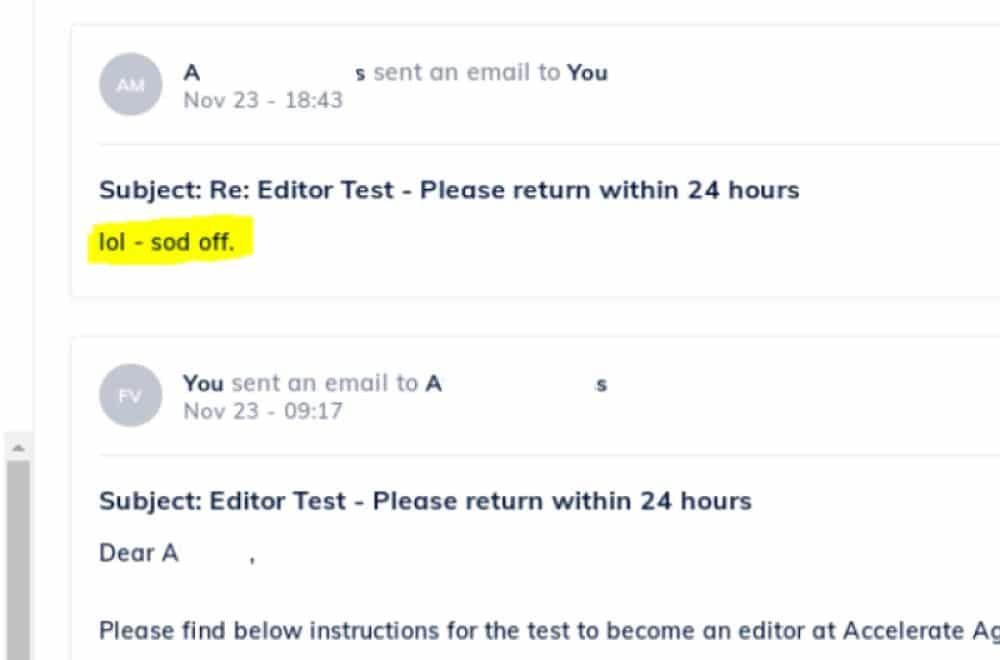
Some editors would give LoL two capital ‘Ls’
It appears poor old A****** ***o may have been led up the garden path. If he wants proof, he could always read our 1400 other versions of the test piece he wrote, although he seems to think his time is far too valuable for that:
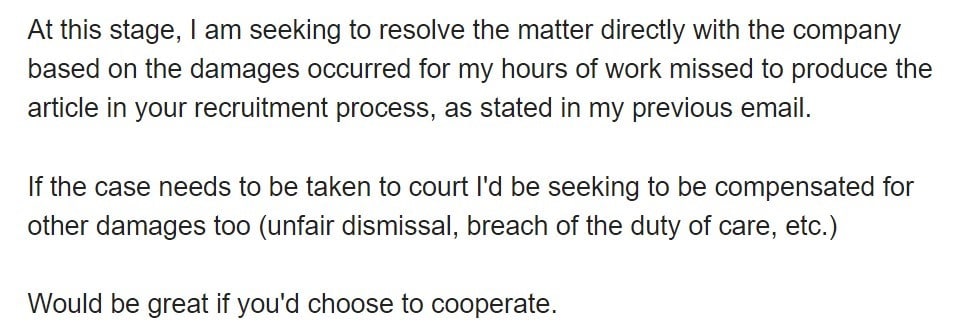
How do you sue for unfair dismissal from a job you never held?!
Accelerating Content Creation
When it comes to creating content for our clients, we only accept the very best. That’s why we deliver tangible results that help propel those clients to new levels. It’s also why we’re pickier than most about who works with us.
Our top-notch team didn’t reach the heights it has by accident. We’ve had to be demanding and strict through every step of our recruitment. Unfortunately, that means many applicants fall by the wayside. Most of them take it well. The odd one? Not so much.

